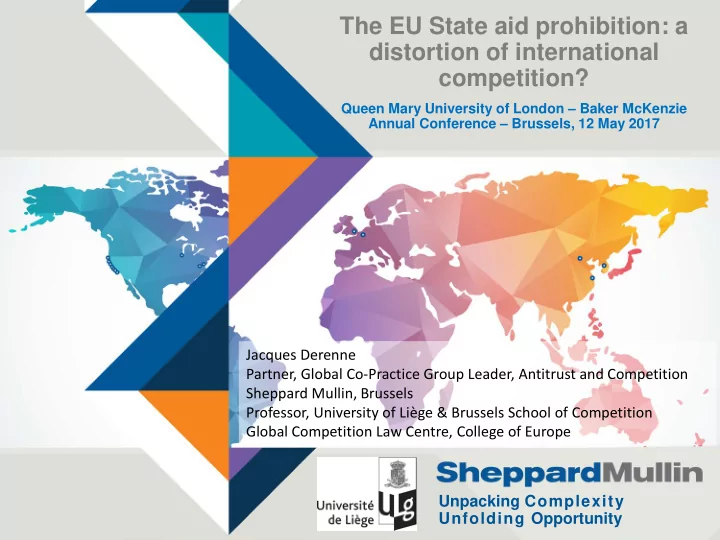

The EU State aid prohibition: a distortion of international competition? Queen Mary University of London – Baker McKenzie Annual Conference – Brussels, 12 May 2017 Jacques Derenne Partner, Global Co-Practice Group Leader, Antitrust and Competition Sheppard Mullin, Brussels Professor, University of Liège & Brussels School of Competition Global Competition Law Centre, College of Europe Unpacking Complexity Unfolding Opportunity
EU State aid control: a necessity • Origins • GATT 1947 – subsidies (ASCM) • 1951 ECSC • Market integration tool • 1956 Spaak Report • Unique situation, unique system • Member States did not fully trust each other: supranational independent arbitrator (Commission) • States interventionism in the EU • From ex ante control to (mostly) ex post control
Global competitiveness • Existing Defense Commercial Instruments • Anti-dumping (new system proposed in 2016, Council agreement on 10 May 2017) • Anti-subsidy (Regulation 2016/1037) • Safeguards (Regulation 260/2009 & 625/2009 – 427/2003) • Limited remedies under State aid control • Matching clause in R&D cases • 2014 R&D&I aid guidelines, § 92 ( distortions of international trade )
Export of EU State aid control (1) • Holistic trade strategy including State aid dimension • Systematic inclusion of State aid provisions on +36 FTAs since 2006 (WTO+) • Recent developments: Mexico, Myanmar, Japan, Mercosur, Tunisia, Philippines, Indonesia • Free Trade Agreements • FTA (Vietnam, South Korea) • CETA (Comprehensive Economic and Trade Agreement, Canada) • DCFTA (Deep and Comprehensive Free Trade Agreement, Ukraine) • New negotiations include multilateral permanent dispute settlement mechanism
Export of EU State aid control (2) • EEA : Articles 61-64 EEE, acquis communautaire , EFTA Court, ESA • "Enhanced" FTA • Same text as Art. 107 – 108 TFUE (e.g., BOS, KOS, MOR, TUN, etc.) • Referral to EU case law • Obligation to set up a national independent State aid authority • Transparency, reports, inventory, EU concepts, etc. • UKR: acquis communautaire , domestic legislation, domestic independent control • Old generation • Reduced scope (e.g., CH, SER, EGY, ISR, etc.) • Information mechanisms, joint committee • CH: specific case (72 Agreement, 99 Transport) • Swissair, Crossair, Swiss (2001 before entry into force in 2002 of the 99 Transport Agreement) • Swisspost (Lyon, 23 Sept. 2016, appealed) • Cantons (2007 complaint, BEPS/OECD, "agreement" of 14 October 2014, Reform RIE III rejected in Feb 2017, Patent Box - OECD) • KOR: limited to subsidies and guarantees to firms in difficulty; restructuring plan
General impact of Brexit on State aid environment ( TF 50 ) EU UK Loss of the "pragmatic contributor" UK devolution will require a domestic control (EU • • • "Good student" discipline is the current control tool for the UK) • Refined economic approach • But UK €8bn v EU €101bn / per capita €90 (GER-FR- • "Good aid" BEL: €170-€240) - UK State aid discipline is an easy • pro-competition (restructuration, financial trade off for the UK crisis, etc.) Aversion for "bad aid" : community of interest with • • risk finance , other guidelines EU discipline Uncertainty, investment postponed (localisation) Transitory period highly complex • Pending cases before Commission, GC and CJEU? UK's rights over aid implemented pre-Brexit? • • Powers of the Commission to implement, post-Brexit, pre-Brexit decisions and rulings? • UK's obligations, post-Brexit, vis-à-vis its obligations from pre-Brexit decisions? • Brexit influence on future State aid policy (2019 review)? • English language? • Uniform framework, tool for "multilateral disarment" • Risk of decentralisation (consequences of GBER) – 10% remaining aid to notify are the most sensitives…
Thank you for your attention! Jacques Derenne Avocat aux barreaux de Bruxelles et de Paris Partner - Co-Practice Group Leader, Antitrust & Competition +32 2 290 79 05 - jderenne@sheppardmullin.com
Recommend
More recommend